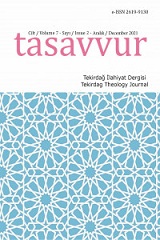Hanefî, Mâturîdî Gelenekten Gelen Diyobend Ekolü’nün Tasavvufa Bakışı
The View of the Diyubend School Coming from the Hanafi, Maturidi Tradition to Sufism
Author(s): Ömer TaySubject(s): Islam studies, Sociology of Religion
Published by: Tekirdağ Namık Kemal Üniversitesi İlahiyat Fakültesi
Keywords: Sufism; Deoband; Bīat; Tawassul; Waḥdat al-wujūd;
Summary/Abstract: The main purpose of this study is to analyse the approaches of Deobandīs to Sufism. Deobandī school was founded in 1866 under the presidency Muḥammad Qāsim al-Nānautawī and is active in the religious life of the Indian subcontinent. In the study, first of all, information about the establishment of Deoband, their struggle against the British, their contacts with the Ottoman Empire and then their understanding of mysticism are given. While investigating the relations of the Deobandīs with sufism, the main sources related to the Deobandīs were examined in terms of literature. They were subjected to a wide examination and their perspectives on sufism were tried to be determined. The results obtained can be briefly summarized as follows: Sunnī Deobandīs see Sufism as a part of the sharī'ah; It is necessary to cling to sufism in order to protect themselves from spiritual diseases, and the followers should follow the sunna and stay away from bid'ahs. In addition, they stated that prophecy is superior to walāyah, miracles are true, and that the unity of existence is not one of the principles of sufism. It has been determined that Deobandīs, who teach sufi classics as well as works written by their own masters in their education curriculum, have a say in many aspects of sufism.
Journal: Tasavvur Tekirdağ İlahiyat Dergisi
- Issue Year: 7/2021
- Issue No: 2
- Page Range: 1275-1304
- Page Count: 30
- Language: Turkish

